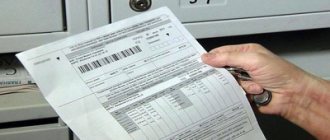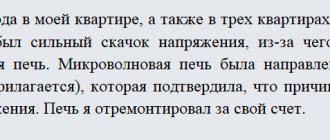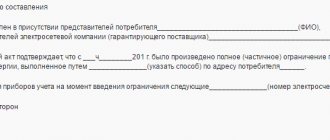In many Russian families, financial problems often arise, and therefore payments for housing and communal services may be suspended for an indefinite period of time, but a pressing question immediately arises - can the water be turned off for non-payment of utilities? Every person needs to know that such a scenario is not at all excluded, however, there are common cases when utility services shut off sewerage for non-payment, without following the law. So, when the actions of public utilities violate your rights, as well as what authorities you can contact in this case, we will consider in this article.
Is it possible to turn it off?
The law does not allow the Criminal Code to suspend the supply of cold water to debtor consumers .
The presence of a citizen’s debt for cold water insurance is not a reason to stop filing it. This is recorded in paragraph 119 of the government decree of May 6, 2011, number 354.
The same subparagraph of the resolution states that the exception to suspending the filing of a cold water supply is the residence of the debtor-tenant in an apartment building . The law prohibits turning off water in such houses regardless of the situation.
Termination of water supply is prohibited only in apartment buildings. There is no law prohibiting turning off cold water in private homes. They may stop supplying it in the event of long-term delays in payments by residents.
What to do if the water was turned off without legal grounds?
Sometimes it happens that water is cut off to a consumer for non-payment, but the legal order is not followed (for example, without prior notice or before the expiration of the legal 90 days, after which the person becomes a defaulter), or even in the absence of any debts at all.
What actions to take to achieve justice? Initially, of course, you should write a statement to your management company demanding the return of water to your home and, of course, you should recalculate for as many days as your home was without water due to the fault of the utility service. Utilities have only three days to consider your application, after which the supply of the disconnected resource must be restored. If you have not been able to achieve the desired result with your application, then feel free to file a claim and follow it to other authorities that deal with similar issues.
The regulatory authorities to which the complaint must be submitted are:
- Housing inspection.
- Rospotrebnadzor.
As practice shows, notifying the utility service of your intention to file a complaint with the authorities that control its activities significantly increases the likelihood of quickly eliminating the existing problem in a short time.
To properly file a claim, you need to follow this procedure:
- We must indicate all the authorities to which the complaint will be sent in a special field for addressees;
- the introduction must indicate the full address of the house with the number of apartments and the period of absence of hot water;
- We enclose evidence that the water supply has been stopped, and also describe the measures taken by the victims to restore the service;
- we refer to material damage that has been caused or is currently being caused, as well as a possible threat to the health and normal functioning of people living in apartments with suspended water supply;
- We request that the water supply be established as soon as possible and that the perpetrators be brought to justice.
If such a problem affected not only your apartment, but also affected other residents of the apartment building, then you need to file a collective claim, which must be signed by all owners who suffered damage due to the fault of public utilities.
If water does not flow into your home, however, they continue to send you receipts, trying to collect money for services that are not provided to you, therefore, your path lies in the prosecutor's office.
You should go there with a request to check the legality of the actions on the part of the management company servicing your home. This complaint must describe the circumstances surrounding the lack of water supply and attach copies of invoices for “allegedly supplied” services, as well as attach evidence of the lack of water. If, after the actions you have taken, water still does not appear in the apartment, this becomes a reason to file a claim in court.
This claim must also be supported by evidence:
- Testimony of neighbors or household members brought in as witnesses.
- Documents proving attempts to resolve the problem without trial.
- An act stating that water does not flow into the apartment. If the utility service refuses to draw up such a document, you have the right to involve a third-party specialist.
- Photographic materials.
- Video recordings.
In order to receive feedback from the structures to which complaints were sent regarding their consideration, it is necessary to note before sending at the very end that you expect to receive the results of the consideration of the complaint in writing at the specified address within the time limits established by law.
Extenuating circumstances
In a private home, cold water may not be turned off under a number of circumstances.
Among them:
- the resident’s documented difficult financial situation, due to which he could not pay utility bills on time;
- a confirmed fact of a delay in wages at work for the debtor tenant, which allows you to count on installments;
- a minor or disabled person living with the debtor;
- documented problems the consumer has with employment;
- the debtor has a difficult financial situation due to objective reasons.
A mitigating factor is also the condition of the house in which the debtor lives. If a disconnection could lead the house to a condition unsuitable for normal living, then the management company does not have the right to do this even if there is a large debt.
What the law says
The main legal issues related to the rules for the provision and refusal to supply utility services are regulated by RF PP No. 354 of 05/06/2011. According to this act, the supplier has the rights that allow him to turn off hot water to consumers. But only if there are violations of the contract between him and the client and subject to a number of procedural rules. The law prohibits depriving people of cold water.
Legal restrictions for suppliers
Articles of the Code of Administrative Offenses of the Russian Federation provide for administrative liability on a point-by-point basis. And this provides for the imposition of a fine on the guilty persons. If it is an official, then the fine will be up to 1 thousand rubles. For legal entities it will be up to 10 thousand rubles.
In some cases, the result of disconnection may be legal proceedings with criminal charges. Then the fine for officials will be 10-20 times larger, and in the presence of circumstances recognized by the court as aggravating, a prison term of up to two years is possible.
How do they turn it off in a private and apartment building?
In apartment buildings, the law prohibits turning off cold water supply. This is possible in private homes. Suspension in such cases is carried out in the following order:
If the consumer does not pay for more than 2 months, then he is recognized as a debtor, who may be limited in the supply of cold water.
The management company first sends a warning to the tenant. It states that the debtor is given 20 days to pay for the service.This time period begins to count from the moment the consumer receives the warning. It can be sent by mail, by telephone or via the Internet.
- If the tenant does not pay for the service within the established 20-day period, the management company limits the water supply to his home.
- The restriction is valid for 10 days. During this period, the debtor can pay for the service, and the water supply in his house will be restored to normal.
- If, after the 10-day restrictive period, the tenant does not pay for the service, then the management company completely stops cold water supply to his house.
The full procedure for limiting and subsequent termination of water supply in the debtor’s house is recorded in paragraph 119 of the government decree number 354.
Consumer responsibility to housing and communal services or how to avoid becoming a willful defaulter?
With all organizations that provide utility services, consumers must certainly enter into agreements in which the areas of responsibility of both parties will be clearly stated. After all, a deterioration in the quality of service provision may become a valid reason for residents to reduce their level of payments.
The rules for the provision of services to the population by public utilities are regulated by a document called the Housing Code.
It states the following:
- In cases where there are no federal regulations, tariffs may be set by local authorities.
- The management company or organization with which the contract for the supply of services has been concluded has the right to independently regulate tariffs, which must be specified in the contract.
- Payment must be made by the 10th day of the month following the billing month, inclusive. Also, from 2021, cold water supply and wastewater can be paid using the advance method.
- In case of non-payment or late transfer of funds, a penalty will be charged.
Responsibilities for paying for utilities fall on both residents living in the apartment under social tenancy agreements and the owners who have undergone the privatization procedure.
In the agreement between the payer and the management company or directly the organization supplying resources to the consumer, it is necessary to indicate the form of payment:
- cashless payments;
- cash.
Owners are advised to install gas, electricity and water meters. Thus, the subscriber will pay only for the volume that was used only in his apartment. In this case, all expenses for the purchase, installation and verification of meters are borne by the owner himself.
It is important to know that even if your living space is empty, you are not temporarily living in it, this fact will not be considered a basis for exemption from paying utility bills.
Companies with which subscribers have concluded contracts are required to send out special notification receipts on a monthly basis. From them, the payer must obtain information about the composition of payments and the amount of amounts to be paid.
If utility bills are not paid, utility companies have the right to impose sanctions, ranging from restrictions on the services provided to eviction from the living space.
If you systematically ignore payment receipts, be prepared to be considered a defaulter. You become such if a three-month debt accrues to established organizations. That is, if payment for utilities is not received for 90 days, then you are already a defaulter. The epithet “malicious” can easily be added to this unpleasant word if debts to supply companies are not repaid within six months.
The following sanctions apply to malicious debtors:
- Fines and penalties for each new day of delay.
- Penalties determined by the court.
- Complete shutdown of gas and electricity.
- Disconnection of water drainage.
- Limitation of water supply by installing special devices in the sewerage system.
If you have a difficult financial situation, but you want to avoid being included in the lists of defaulters compiled by utility companies, then you should pay small amounts of debt at least once every three months. Thus, the moment of payment may delay the imposition of sanctions for another three months.
How to avoid?
You can avoid interruption of water supply in a private home by providing evidence to the Criminal Code that timely payment for the service was not possible due to objective reasons.
The debtor tenant can present to the Criminal Code documents proving that he has a difficult financial situation. This could be a document about arrears of wages or a certificate of unemployed status.
You can avoid turning off the cold water supply in your home by presenting a document stating that a minor or a disabled person lives in it.
The consumer-debtor can also provide the Criminal Code with a document about the emergency condition of the house or invite an employee to confirm the fact that the suspension of water supply, like heating, can damage the property, violate the rights of other residents and render the entire house unusable.
How to restore water supply after a legal shutdown?
Disconnecting an apartment from the water supply and blocking the sewerage system certainly causes a lot of inconvenience and interferes with normal life, especially if there is a small child in the family, so every tenant wants to get rid of these inconveniences as soon as possible. But he often resorts to measures that are not entirely legal, that is, he tries to dismantle the locking systems himself using improvised means.
Such actions in most cases lead to violations of the integrity of the sewer system, which, in turn, will inevitably entail penalties for the damage that was caused.
If you are truly a persistent offender and all the measures taken against you by public utilities are justified from the point of view of housing legislation, then you will be able to regain your water supply, and thereby comfortable living conditions in your home, only if you pay off all debts to service providers.
You have two options for repaying the debt:
- Pay the accrued amounts in full, preferably in one payment. After funds are received into the account of the management company or water utility, within two days the water supply will be resumed and all plugs from the sewer drains will be removed. This procedure must also be paid by the person from whom the debt is collected.
- If your financial situation is quite deplorable and you cannot afford to pay off the entire amount of the accumulated debt, however, you have a desire to cover the debt, then the utility services can and probably will meet you halfway. What to do? In such a situation, it is envisaged to conclude an agreement between the subscriber and the resource provider on the restructuring of the stuck debt. This means that the amount you must pay is divided into parts that are repaid within the terms specified in the contract. And then the water will return to your home again.
At the same time, do not forget to make current payments.
If this does not happen, and debts begin to accumulate again, then you may again find yourself without water, because in such a situation its supply may be turned off again, and this can be done without warning. Since installment plans cannot be provided to all defaulters, what should you do to get it?
The following options are possible:
- if non-payment of utilities is caused by delay in payment of wages. Then you need to contact your management company with a document from the place of work, which confirms this delay, indicating from what time payment has not been made;
- if all family members collectively have an income that does not reach the subsistence level. Then each person living in the apartment provides a certificate from their official place of work (or study, employment center). If you are not officially employed or are not employed, you will not receive the status of a low-income family;
- the presence of the status of a large family, as well as children under the age of majority, family members with disabilities who require costs for their treatment, maintenance, training, confirmed by documents, makes it possible to receive installment plans or subsidies;
- if you temporarily lost your job, this will also be a valid reason.
Due to these reasons, you have the right to both defer payment (or pay it off in installments) and to receive financial assistance from the state to cover the debt to the utility service. This subsidy is valid for six months, however, it is very easy to lose it if you just fall behind on your utility bills more than twice in a row.
What to do if cutting off water supply was illegal?
If the water supply is illegally interrupted, the tenant must complain to the state housing inspectorate. You can also file a complaint with Rospotrebnadzor or the prosecutor's office.
The document should display the following information:
the name of the authority to which the complaint is sent, its address;- personal data of the person filing the complaint (full name, place of residence, contact details);
- the essence of the violation;
- evidence confirming the fact of illegal shutdown of water;
- a specific request to restore water supply to the house;
- date along with signature.
If there is no proper response from the housing inspectorate, Rospotrebnadzor or the prosecutor's office, you should file a lawsuit against the Criminal Code.
Everything a consumer needs to know about turning off cold water can be found in this section.
How to make a claim and complaint?
There are no unified forms for drawing up claims and complaints, so they are drawn up according to the general rules for drawing up business papers:
- The management company's claim is drawn up in the name of its director. The document contains the following points:
- name of company;
personal data of the applicant (full name, address, contacts);
- the essence of the claim with references to the norms of law. In this paragraph, it is necessary to indicate the illegality of disconnection due to lack of notification or partial payment;
- the requirement to restore the supply of utility services within a specific time frame and recalculate payments for the period of shutdown;
- date and signature.
- A complaint to the Housing Inspectorate or the Prosecutor's Office is filed after receiving a negative response from the Criminal Code or when the consumer's requirements are completely ignored. It is drawn up in the name of the head of the organization and includes items:
- name of company;
personal data of the applicant;
- description of the circumstances of the case indicating the fact of illegal water shutoff. This paragraph describes filing a claim with the Criminal Code and reports the content of the organization’s response;
- please evaluate the actions of the management company’s employees;
- date and signature.
- A statement of claim is filed in court after receiving a response from the regulatory authorities. provided that the problem has not been solved or if it is possible to prove the moral damage caused by the shutdown. Such cases are within the jurisdiction of district courts, so you need to contact this organization.
The document is drawn up according to general rules and includes points:- name of the judicial authority;
plaintiff's details: full name, residential address, telephone number;
- details of the defendant: full name of the management company, full name of the director, legal address, telephone number;
- statement of claims. This paragraph describes the circumstances of turning off the water supply, the date of filing a claim with the Criminal Code and the content of the response. You can also describe the circumstances of contacting regulatory authorities. Your own claims must be supported by references to the violated norms of the law;
- We request that it be illegal to turn off the water supply based on current legislation.
The claim must be accompanied by a receipt for payment of the invoice (if available).
Sample complaint from the management company about turning off hot water.
Attached to the complaint is a copy of the complaint sent to the Criminal Code and the response received from it.
Attached to the statement of claim are copies of the claim to the Criminal Code and the complaint to the regulatory authorities, as well as the responses received from these organizations.
IMPORTANT . The outcome of the case when going to court directly depends on the correctness of the statement of claim. Therefore, it is more advisable to seek help in its preparation from a qualified lawyer.
Who pays
If the disconnection occurred due to debt, that is, the consumer is to blame for this, reconnection is carried out at his expense. Payment is calculated according to the tariffs of the management company.
In cases where the actions of the utility companies were illegal, the connection for residents will be free.
Dear readers! To solve your problem right now, get a free consultation
— contact the lawyer on duty in the online chat on the right or call: +7 (499) 938 6124 — Moscow and region.
+7 (812) 425 6761 — St. Petersburg and region. 8 (800) 350 8362 - Other regions of the Russian Federation You will not need to waste your time and nerves - an experienced lawyer will solve all your problems! Or describe the situation in the form below:
Temporary resource blocking
According to the law, people have the right to turn off the water supply without prior notice only temporarily if a natural disaster or force majeure occurs (pipeline or heating pipeline failure), as well as when a threat of an emergency is identified. The law does not provide for any further cases of disconnection without notification. Even if this is a planned shutdown, the management company is responsible for notifying residents at least three days in advance.
You don’t need to think long about the example, since everyone knows the planned summer shutdowns of hot water, when repair and maintenance work is carried out on the utility systems of apartment buildings.
Without notification, the management organization has the right to turn off utility services due to the fault of residents, for example, when:
- The owner of the apartment connected to any engineering system without permission;
- Communication systems in the premises are in disrepair, due to which there is a clear threat of flooding for residents;
- The owner of the premises was responsible for the accident;
- The owner or tenant made illegal changes to the communication structure (activities without permission, not coordinated with the regulatory authority, such as moving a radiator to another location or to a balcony);
- The authorized bodies issued a corresponding order.
Fine from the Federal Antimonopoly Service of 600,000 rubles for restricting consumer access to networks
The Federal Antimonopoly Service for the Rostov Region brought administrative responsibility to the water supply contractor for violating the rights of a disciplined consumer.
The contractor disconnected the debtor - the main subscriber - from the HVS. At the same time, the technological connection of neighbors was carried out indirectly, through the networks of the defaulter. Therefore, they also found themselves without cold water, although they paid their bills on time and in full.
Having received a complaint from a consumer about illegal disconnection from water supply networks, FAS officers conducted an inspection. Since the organization was previously held liable for an offense under Part 1 of Art. 9.21 of the Code of Administrative Offenses of the Russian Federation, the department fined her 600,000 rubles in accordance with Part 2 of Art. 9.21 of the Code of Administrative Offenses of the Russian Federation - for repeated violation of the rules of non-discriminatory access to water supply networks.
The executor of the Civil Code did not agree with this decision and filed a lawsuit, demanding that the decision of the Federal Antimonopoly Service be declared illegal and the administrative sanctions canceled. The plaintiff insisted on the incorrect classification of the offense.
When can cold water be turned off under legal circumstances?
The law provides for circumstances when turning off water, both cold and hot, is permitted. These include:
- planned repair work to maintain in-house engineering systems;
- arbitrary connection by a tenant of an apartment to intra-house networks;
- emergency situations;
- troubleshooting after natural disasters.
Providing notice in such situations is optional.
In such cases, when turning off or suspending the supply of cold water, utility services must follow several rules: do not harm the property of residents and do not violate the sanitary standards of the premises.
Legal requirements
The provision of housing and communal services to individuals is regulated by PP No. 354. The supplier has the right to suspend the supply of water after sending a warning to the debtor in advance. The recipient must familiarize himself with it 30 days before restrictive measures are taken against him. Reasons for suspending the provision of housing and communal services:
- Non-payment for 3 months.
- Payment not in full for 3 months. after sending a warning.
- Violation of the provisions of the debt repayment agreement concluded between the debtor and the supplier.
According to sanitary standards, it is prohibited to suspend the supply of:
- heating (or gas intended for it);
- HVS;
- sewerage.
Information
Without these services, it is impossible to live in the living space, and accordingly, the Housing Code of Russia will be violated. The ban is established by clause 307 of PP No. 354.
Utilities are authorized to turn off:
- electricity;
- GVH;
- intercom system;
- gas, which is intended for cooking food.
Where to submit
Filing a claim is carried out by redirecting a registered letter with notification to the management company or directly to the person responsible. The paper is drawn up in 2 copies. One remains with the employee, the other with the applicant with signature.
10 days are allotted for consideration of the application and issuance of a written response.
The following organizations to solve the problem of inaction of the management company are Housing Inspectorate, Rospotrebnadzor. Employees are required to respond to the complaint within 30 days of receipt of the complaint. The last resort is the court if previous organizations do not take action or ignore the deadlines for issuing a response.
Preventive measures for individual officials
When filing a complaint against the management company with the Housing Inspectorate, it is within the competence of the latter, referring to the Civil Code of the Russian Federation, to fine an official who holds a responsible position in the Criminal Code on average one thousand rubles, or to fine a legal entity ten thousand.
When turning to the judicial authorities, the management company is already involved under the articles of the Criminal Code of the Russian Federation. According to him, a preventive measure can be in the form of:
- Fine to an official up to ten thousand rubles;
- Fine for a legal entity - up to two hundred thousand;
- Imprisonment for a period of two to five years, if the actions of the official led to aggravating circumstances.
Since the management company is unlikely to want to receive, whatever the fine, from higher structures, as a rule, all issues with consumers are resolved pre-trial. However, it is necessary to act immediately, persistently and competently. Experienced lawyers specializing in this legal field will help you get rid of the problem as quickly as possible and as effectively as possible. Even if the consumer does not want or is unable to pay for full legal support of the process, even one consultation will be useful to coordinate further actions.









